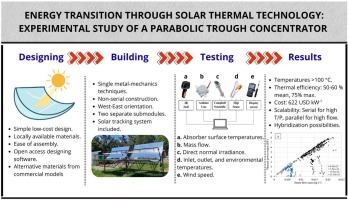Energy transition through solar thermal technology: experimental study of a parabolic trough concentrator
IF 7
2区 工程技术
Q1 ENERGY & FUELS
Sustainable Energy Technologies and Assessments
Pub Date : 2025-09-16
DOI:10.1016/j.seta.2025.104573
引用次数: 0
Abstract
This study evaluates a low-cost parabolic trough concentrator constructed using locally available materials for solar-thermal applications. The system achieves temperatures exceeding 100 °C for extended periods, demonstrating potential for industrial processes such as textile dyeing (120 °C steam) and cleaning (55 °C hot water). With a cost of 622–1118 USD kWt−1, the design prioritizes affordability, utilizing high-reflectance aluminum sheets and borosilicate glass tubes (19 % of costs) to minimize heat loss. Key components include tracking systems (13 %) and monitoring devices (47 %), though non-serial manufacturing reduces structural expenses (11 %). Performance enhancements—such as curved mirrors, vacuum insulation, or serial/parallel module configurations—could improve efficiency but may raise costs. The PTC supports sustainable industrial heat generation, reducing fossil fuel dependence and aligning with the Sustainable Development Goals (Affordable Clean Energy) and 13 (Climate Action). Hybridization with biomass or thermal storage systems can mitigate solar intermittency, further cutting CO2 emissions. Additionally, the concentrator serves as an educational tool for renewable energy research. This work underscores the viability of solar-thermal technology in decarbonizing industrial processes while emphasizing cost-effectiveness and scalability for global climate solutions.

太阳能热技术的能量转换:抛物线槽聚光器的实验研究
本研究评估了使用当地可用材料建造的低成本抛物线槽聚光器,用于太阳能热应用。该系统可长时间达到超过100°C的温度,展示了纺织染色(120°C蒸汽)和清洁(55°C热水)等工业过程的潜力。该设计的成本为622-1118 USD kWt−1,采用高反射率铝板和硼硅酸盐玻璃管(占成本的19%)来最大限度地减少热量损失。关键部件包括跟踪系统(13%)和监控设备(47%),尽管非系列化生产减少了结构费用(11%)。性能的增强——比如曲面镜、真空绝缘或串行/并行模块配置——可以提高效率,但可能会增加成本。PTC支持可持续的工业供热,减少对化石燃料的依赖,并与可持续发展目标(负担得起的清洁能源)和13(气候行动)保持一致。与生物质或储热系统的杂交可以缓解太阳能的间歇性,进一步减少二氧化碳的排放。此外,该浓缩器还可作为可再生能源研究的教育工具。这项工作强调了太阳能热技术在脱碳工业过程中的可行性,同时强调了全球气候解决方案的成本效益和可扩展性。
本文章由计算机程序翻译,如有差异,请以英文原文为准。
求助全文
约1分钟内获得全文
求助全文
来源期刊

Sustainable Energy Technologies and Assessments
Energy-Renewable Energy, Sustainability and the Environment
CiteScore
12.70
自引率
12.50%
发文量
1091
期刊介绍:
Encouraging a transition to a sustainable energy future is imperative for our world. Technologies that enable this shift in various sectors like transportation, heating, and power systems are of utmost importance. Sustainable Energy Technologies and Assessments welcomes papers focusing on a range of aspects and levels of technological advancements in energy generation and utilization. The aim is to reduce the negative environmental impact associated with energy production and consumption, spanning from laboratory experiments to real-world applications in the commercial sector.
 求助内容:
求助内容: 应助结果提醒方式:
应助结果提醒方式:


